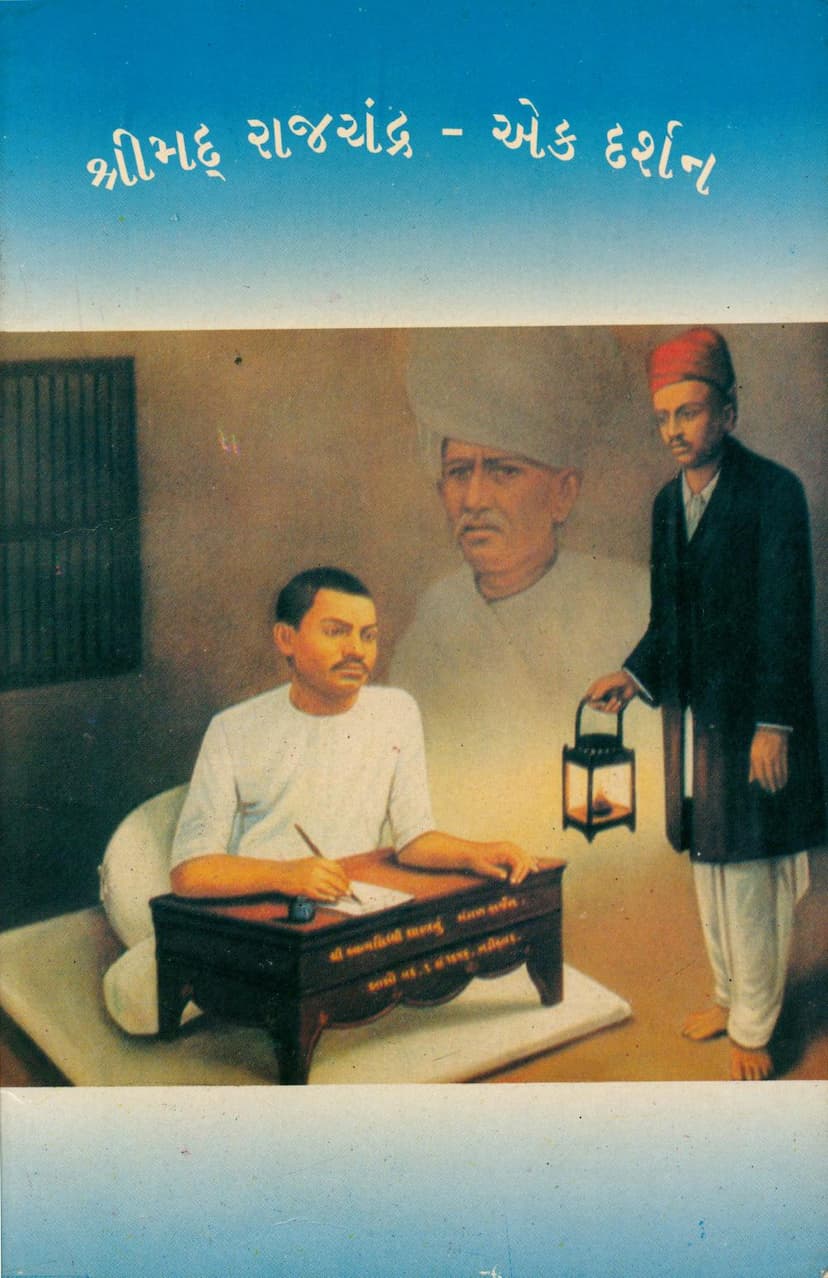Shrimad Rajchandra Ek Darshan
Added to library: September 2, 2025

Summary
Here's a comprehensive summary of the Jain text "Shrimad Rajchandra - Ek Darshan" by Gunvant Barvalia, based on the provided pages:
The book, "Shrimad Rajchandra - Ek Darshan," published by Vishvavatsalya Prayogik Sangh and Sanskruti Darshan, aims to present a multifaceted understanding of Shrimad Rajchandra, going beyond the conventional perception of Jainism as solely focused on renunciation. The author, Gunvant Barvalia, emphasizes that to truly understand Shrimad Rajchandra, one must also understand Gandhian thought, and vice versa.
Key Themes and Insights:
-
Beyond Renunciation: The text challenges the common misconception that Jainism advocates for the abandonment of worldly duties. It highlights how Shrimad Rajchandra, through his influence on figures like Mahatma Gandhi, integrated societal engagement and action into his spiritual philosophy. This dual focus on devotion, knowledge, and action is presented as crucial for a complete understanding of Shrimad.
-
The Influence of Shrimad Rajchandra on Mahatma Gandhi: The book strongly emphasizes the profound impact Shrimad Rajchandra had on Mahatma Gandhi's spiritual and philosophical development. Gandhi himself acknowledged learning extensively about the "religion of compassion" from Shrimad. The text suggests that understanding Gandhi's philosophy is impossible without understanding Shrimad's.
-
Early Life and Spiritual Awakening: The book details Shrimad Rajchandra's birth in Vavanion, Saurashtra, and his early life. It mentions his childhood name, "Lakshminandan," later changed to "Raychand," and how he became revered as "Shrimad Rajchandra." His early inclination towards Jainism, particularly the concept of forgiveness in the Jain 'Pratikraman' sutra, is highlighted. A significant event was his manifestation of Jatismarana (knowledge of past lives) at the age of seven, triggered by contemplating death, which provided him with profound insights into the soul's existence and spiritual development.
-
Intellectual Prowess and Renunciation: Shrimad Rajchandra's exceptional memory and his ability to complete a seven-year study curriculum in just two years due to past-life knowledge are mentioned. His profound understanding of celibacy at the age of 17 is illustrated by his poetry. Despite being a successful and honest businessman, his spiritual depth was immeasurable. The text recounts an incident where he returned profits to an Arab merchant in need, showcasing his inner spiritual state. His extraordinary avadhana (memory retention) power, recognized with a gold medal in Mumbai, and his refusal of an invitation to demonstrate these abilities in England due to disinterest in material achievements, further attest to his elevated character.
-
Literary Contributions: The book categorizes Shrimad Rajchandra's extensive literary works, including letters to seekers, independent poems, and significant philosophical treatises like Mokshamala, Bhawanabodhi, and Atmasiddhishastra. It also mentions his translations and interpretations of other Jain texts. His writings consistently emphasize the importance of a Guru, the primacy of the soul's dharma over sectarian differences, and tolerance towards other viewpoints.
-
Atmasiddhishastra - A Masterpiece: The text dedicates significant attention to Atmasiddhishastra, describing it as an invaluable scripture for liberation. It is characterized as a profound work that encapsulates the essence of the soul, demonstrating Shrimad's wisdom, equanimity, and sincerity. The book explains how Shrimad distilled the teachings of Tirthankaras into this accessible Gujarati text, making profound Jain philosophical principles understandable to the masses. The composition of Atmasiddhishastra in just 1.5 hours, inspired by a request for poetic verse, highlights its divine origin.
-
Social Consciousness and Empathy: The book reveals Shrimad Rajchandra's deep empathy for the suffering of his fellow humans and his nation during a period of social unrest and injustice in India. His prayers for the upliftment of the Aryan people, urging virtues like righteousness, love, humility, and devotion, underscore his concern for societal well-being. These prayers extended to a desire for the happiness and health of all beings.
-
Gandhian Interpretation of Shrimad's Teachings: The text elaborates on how Mahatma Gandhi internalized Shrimad's ideals. Gandhi's commitment to truth and non-violence, his emphasis on celibacy and purity of conduct, his practice of non-possession (aparigraha), and his advocacy for social justice were deeply influenced by Shrimad. Gandhi's own words are quoted to illustrate the profound impact Shrimad had on his spiritual journey and his understanding of dharma. The text highlights Gandhi's adoption of Shrimad's counsel on various ethical dilemmas, such as the use of leather and the practice of non-violence towards insects.
-
The Nature of True Dharma and Compassion (Daya): A significant portion of the book is dedicated to exploring the concept of Daya (compassion) as the core of dharma, as articulated by Shrimad Rajchandra. It differentiates between various forms of Daya, including Dravya Daya (protection of physical beings), Bhava Daya (sympathy for those in distress), Sva Daya (self-care for spiritual progress), and Para Daya (compassion for others). The text argues that true compassion is rooted in understanding the soul's inherent nature and acting for the welfare of all beings. Shrimad's verses on Daya are presented as a guiding principle for spiritual seekers.
-
The Role of Art and Literature: The book emphasizes Shrimad Rajchandra's belief that art, literature, and music should be directed towards spiritual upliftment and self-realization. Art that does not serve the soul's progress is considered futile. The works of great saints and poets are lauded for their spiritual purpose, while art that caters solely to sensory pleasure or incites negative emotions is critiqued. The text advocates for art that fosters ethical values, national pride, and ultimately, leads to the realization of the self.
In essence, "Shrimad Rajchandra - Ek Darshan" presents a comprehensive view of Shrimad Rajchandra as a multifaceted spiritual master, a profound poet, a socially conscious individual, and a significant influence on India's national father, Mahatma Gandhi. It encourages readers to delve deeper into his teachings to understand the integrated approach to spirituality, action, and societal well-being that he embodied.